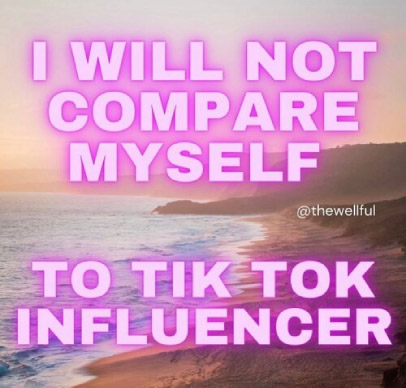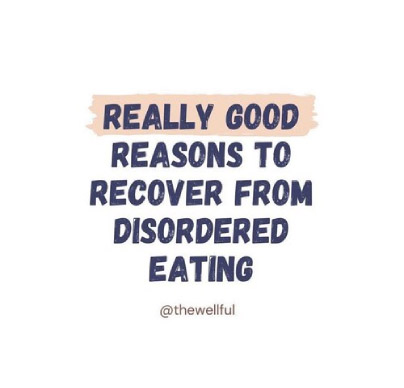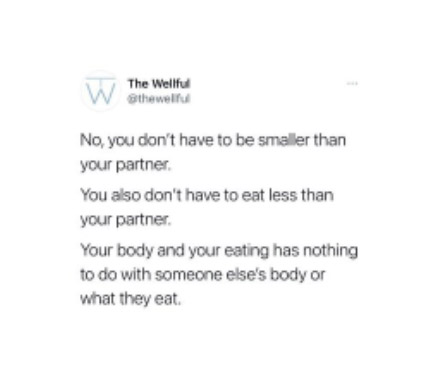If you’ve ever found yourself on Google searching, “How to stop overeating,” the first thing we can tell you is that you’re not alone. I hope in the context of the many, many articles you come across in that Google search, that this one helps to lessen any shame, judgement or desperation you might feel right now. However, if feeling uncomfortably full or out of control around food is getting in the way of your ability to enjoy food and life overall, it may be time to offer yourself a check in…which you are, because you’re here! That’s where we come in. As a registered dietitian, I’m here to provide you with 10 actionable steps you can take to address overeating and feel better every day. No matter who you are or what your experience with food has been, you deserve to feel well. Let’s address overeating together.
A note on language
I want to make a quick note on language. The title of this post includes the term ‘overeating’ because that’s how many people describe this feeling, but this term can sometimes feel a bit shame-y. To bring some human-ness in here, we all eat past fullness from time to time (more on that later!). This blog uses the term ‘overeating’ partly because that is how people who are looking for this article on Google will find it. I want to invite you to remember and be mindful that there is no ‘perfect’ way of eating and if you don’t resonate with the term ‘overeating’ you can think of it as ‘overly full’ or past comfortable fullness which is often how I’ll describe it when working with clients. If you are noticing a pattern around food that often leaves you feeling uncomfortably full, sick, feeling guilt or shame for food choices or feels out of control, this article can help you to explore what might be going on and how to support feeling better.
Understanding What Leads to Overeating
There are so many factors that contribute to tending to overeat. Emotional triggers, stress, boredom, food availability, lack of access to food, generational dieting, past trauma around food scarcity, and so much more can lead to overeating. The fact of the matter is that overeating looks different for everyone. For some people, it’s the perception of eating what they’ve decided is “too many calories.” For others, it looks more like eating past satiety and to the point of physical discomfort. For someone who has been eating less than their body needs, feeling adequate fullness might feel scary or similar to eating past fullness.
Strategies to Prevent Overeating
Let’s start with the fact that eating past fullness is an extremely human thing to do. We all experience times of overeating, miscalculating how hungry we are, or feeling uncomfortably full. Sometimes we eat past fullness because we’re sharing a meal with friends and it tastes so good, other times you might not realize how full you are until a few minutes after eating, other times we might not be paying attention or feel disconnected from our body for one reason or another.
Identify Potential Triggers
If you’re looking to stop overeating, the first thing you need to do is identify how this comes up for you. Is it something that happens occasionally? Can you notice a pattern around the circumstances that typically surround times of overeating? Is it when you have the house to yourself? Or when you get bad news and are coping with food? Or is it when you go out to eat and are eating foods you sometimes label as ‘bad’ or ‘off-limits’? Our goal at The Wellful is to give you the tools and support so you can feel more peace around food and in your body. If overeating is something that makes you feel out of control, causes distress, or makes it hard for you to trust yourself around certain foods, I’m here to help.
Here are 10 tips to help manage overeating and feel more peace around food.
Notice Any Patterns Around Overeating
I talk with my clients about ‘gathering the context’ when they notice themselves feeling out of control around food, overeating, and feeling disconnected from their bodies while eating. This means zooming out to ask yourself “What else was going on?” Some examples might be work or personal stress, being around food that you don’t typically let yourself eat, feeling overly hungry, long periods between meals, feeling lonely, a nighttime snack being the only time you have to yourself all day, or restricting foods except for special occasions or weekends. Since shame can be so intertwined with our feelings of fullness, or discomfort after eating, I think it’s important to acknowledge the many factors that influence our eating patterns. This context can help to shift the blame from “I should have more ‘willpower’ around food” to “There are many factors that influence my eating and I’m getting curious about how they show up for me”.
Avoid Food Restriction
The root of feeling out of control around food is restriction. This can be tough, especially for people with a history of dieting or strict food rules. Eating past fullness is often the body’s way of compensating for missed energy (aka calories). Think about your hunger and fullness as a pendulum. The farther you pull to the ‘restriction’ side, the farther the pendulum will swing to the ‘overly full’ side. If we can move the pendulum to a more comfortable hunger (eating every 3-4 hours on average), the pendulum will swing more comfortably between hunger and fullness and less often be in the extremes. If you are newly allowing yourself more permission to eat certain foods, or more food overall, is quite normal as the body goes through the nutrition rehabilitation period to replenish the nutrients and energy. The best thing to do to overcome overeating in this case is to avoid restriction. This can be scary for many, which is why it’s a good idea to work with a registered dietitian throughout this process.
Eating as a Coping Mechanism
Recognizing what prompts you to overeat is key. There are so many things that cause us to overeat: stress, sadness, boredom, and happiness are just a few. Identifying triggers may help you confront your overeating head-on, so you can develop alternative coping strategies. It’s not that food shouldn’t be a part of our coping strategies – it absolutely can be – but just like any coping skill, we want to have more than one. If you’re noticing that food is a main or only coping mechanism, this awareness is a key first step. You might try making a list of other tools or comforting resources you have that can offer you support. Food can and likely will be on that list, but allowing space for other options can allow to reduce the pressure on food alone. This can be something really helpful to bring up to your therapist or dietitian so that you can get support as you potentially change or add in new skills. If you’ve tried what feels like everything and are feeling out of control or often uncomfortable after eating, getting support from a registered dietitian like myself can help.
Plan To Eat Every Few Hours
Having regular meals helps you establish body trust because your body knows you will continue to provide food regularly to keep you fueled throughout the day. This reduces the risk of decision fatigue, something many of us struggle with in every aspect of life. After years of dieting or trying to push off eating throughout the day, it can be tricky to know how to establish more regulated eating patterns, without feeling obsessed. And before you blame yourself and say something like “I should know how to do this on my own” remember that if you’ve spent years practicing restriction, strict food rules or numerous other reasons you might feel disconnected from your body. Getting individualized support doesn’t mean someone ‘tells you what to do’ rather, we’ll work together to help you develop more trust within your body, offer tools and supports you can put into place to have a more flexible structure around eating, and explore the many factors that influence your relationship with food and your body, together.
Eat Satisfying, Balanced Meals
Eating regular meals that incorporate all macronutrients carbohydrates, protein, and fat as well as fiber offers lasting, sustainable energy throughout the day. A common cause of feeling overly hungry, or overly full is skipping meals, skipping out on a macronutrient (remember, carbs keep you alive!). Because of diet culture, food marketing and fear mongering about certain foods it can be challenging to quiet the noise and figure out what is filling, enough and sustainable for you.
Another key aspect here is that it’s important to eat regular meals. That means not skipping meals. You might try to do this as a way to “save” calories, but the truth is that 9 times out of 10, it leads to overeating later on. Do yourself a favor and nourish your body throughout the day. It will thank you for it.
Keep Nourishing Snacks Available
Do you notice that your snacks are mostly 100 calorie packs and they don’t keep you feeling satisfied or lead to feeling out of control later? Aim for snacks that combine at least 2 food groups (carbs, fat, protein). Pairing at least 2 food groups together for a snack, makes it easier to stabilize your blood sugar levels and give your body enough fuel to get you through the next couple of hours until you eat again. That growling in your stomach is a sign that your body needs energy and sustenance. Rather than trying to “push through it” (that’s never a good idea, by the way), nourish yourself with pre-made snacks. Homemade trail mix, cottage cheese or and fruit, and hummus and crackers, half a sandwich, a protein bar, avocado toast, apple slices and peanut butter are some of my go-tos.
Mindful Eating
Mindful eating involves paying close attention to your food, savoring each bite, and eating slowly. We’re not going to eat mindfully every time we eat – because life happens! – but it can be a helpful tool for gaining more awareness and working on connecting with your body and internal cues of hunger and fullness. This will not only help you feel less disconnected from your body or eating, but it will also make eating more enjoyable. And yes, eating is meant to be enjoyable!
Practice Self-Compassion
If you end up overeating, please don’t beat yourself up. Eating past fullness is part of the human experience, which means overeating is as well. If you happen to overeat, respond with kindness rather than shame Stopping overeating and getting acquainted with your hunger, fullness and satiety cues doesn’t usually happen overnight. It’s a gradual process, so give yourself compassion throughout this journey.
Seek Professional Help
It can be hard to stop overeating on your own. It’s not a matter of willpower or being “good enough.” Sometimes you need the help of a professional like a registered dietitian with experience in disordered eating patterns and behaviors.
You don’t have to do this alone
Consider getting individualized support with The Wellful. We offer education, resources, and a supportive environment for eating without guilt and fostering body respect.
Feel free to call us at (925) 725-2761 or click here to schedule a free discovery call. Get started and start feeling better today.











